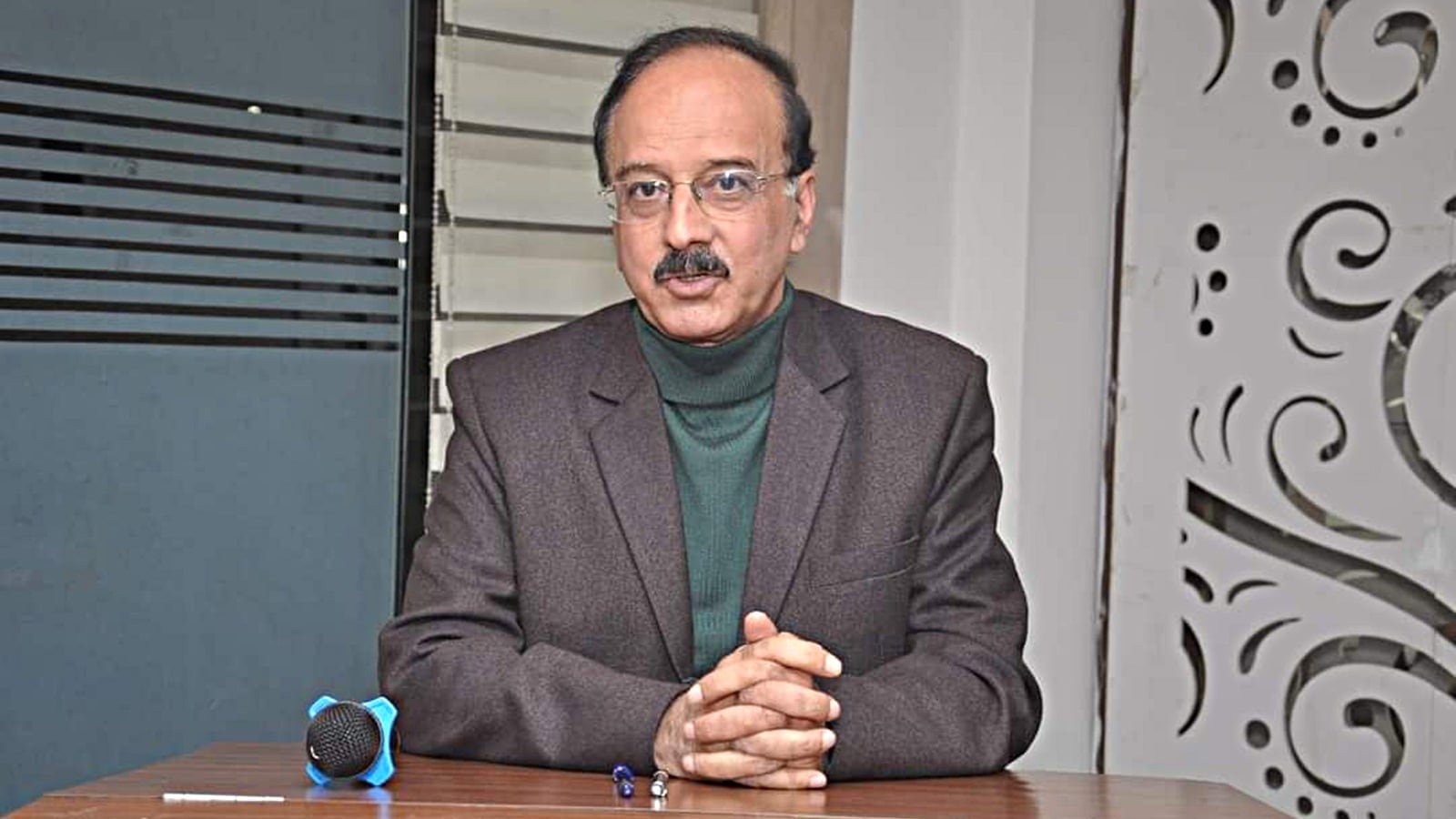Agri expert says in India farmers left ‘Bhagwan bharose’, backs MSP
Says farmers need to be prepared for food sector threats ahead
 Devinder Sharma. (Express Photo)
Devinder Sharma. (Express Photo)A day after the ‘Dilli Chalo’ farmer leaders rejected the Centre’s proposal to procure pulses, maize and cotton at the minimum support price (MSP) by government agencies for five years, saying it was not in their interest, The Indian Express had a chat with renowned agricultural policy expert Devinder Sharma who backed a legal MSP, which, according to him, is one of the ways to get the farmers out of the “prevailing agrarian crisis”. The food and trade analyst also says India is the only country where farmers are left to their own devices, that is, “Bhagwan bharose”. In a conversation with Raakhi Jagga, the expert (Devinder Sharma) talks about the ongoing farmers’ protest, government proposal and future of farmers as a community, among others. Here is an excerpt.
Q. Being an agricultural expert, what is your opinion on the ongoing protest of farmers at Shambhu and Khanauri borders?
A. The demand by protesting farmers is a legal right for MSP on all crops. In my understanding, a legal MSP is one of the ways to get farmers out of the prevailing agrarian crisis. The farmers are actually fighting for a long-overdue structural change required in agricultural pricing policy. The reason being that markets across the world have failed to prop up farm incomes. Even in the US, from where we cut and paste policies, every farmer gets a domestic support of Rs 79 lakh per year. In the European Union, farmers get a subsidy of a little over 100 billion euros. China gives more than $215 billion subsidy to its farm sector. An OECD (Organisation for Economic Co-operation and Development) study examining the support to farmers in 54 countries says that India is the only country where farmers have been left, as I would say, to ‘Bhagwan bharose’. In all other countries farm losses are covered by budgetary support. The study also points out that Indian farmers have been incurring losses since 2000, and this is primarily because they have been denied an assured income by way of a guaranteed price. In India, farmers are at the bottom of the pyramid. The Situational Assessment Survey for Agricultural Households that came out in 2021 has computed the average monthly income of a farm household at Rs 10,218. If we were not to include income from non-farm activities, farmers earn just Rs 27 per day from farming. And yet, farmers have been producing a record harvest year after year. It is time to set things right. These protesting farmers are actually standing up for the entire farming community. By asking for a legal framework for 23 crops, they are actually wanting the economic benefit to flow to farmers across the country.
Punjab and Haryana grow wheat and paddy in majority for which they are already getting MSP.. how justified is their demand of seeking MSP as a legal guarantee?
Ans: It is true that Punjab and Haryana farmers are already getting MSP, and every grain they bring to the mandis is procured. Farmers realise that this prerogative is only limited for them. But this does not mean they can enjoy the special privilege while their fellow brethren continue to suffer. Economic Survey 2016 had clearly shown that the average farm income in 17 States of India, which means roughly half the country, was only Rs 20,000 per year. In other words farmers in half the country somehow continue to survive with a monthly income of Rs 1,700 per month. Innumerable times, I have seen farmers expressing concern as to why farmers in the rest of the country continue to languish.
Secondly, Punjab too needs a legal provision for MSP for crops that they grow besides wheat and paddy. In fact, the need is also to seek an assured package for vegetables and fruits. For instance, kinnow is the horticultural crop to which farmers were encouraged to shift. With prices crashing this year, many farmers have even uprooted their orchards. If kinnow had a price assurance, farmers would have survived the price fall. We have also seen farmers demanding an MSP for basmati rice and also for potato in the past.
Q. If we look at the world around, farmers appear to be in distress, be it the European nations, the US or even India, for that matter. What is the reason for it?
A. As I said earlier, markets have failed farmers everywhere. In the US, the rate of suicides in rural areas is 3.5 times more than the national average. In Europe, massive farm protests in the past few weeks were seen in 16 countries, including Germany, France, the Netherlands, Belgium, Poland, Italy, and Spain. Protests are still continuing in some countries. While environmental regulation has been a serious bone of contention, these farmers are also frustrated because they too have been denied a fair price for their crops. The farmers say that they don’t want incentives, what they need is – to fix a correct value for their crops.
Confederation Paysanne – a small-farmers’ organisation in France – has been asking for banning all purchases of farm products below cost price (production cost+remuneration for farmers work+social protection). In a way, this is exactly what Indian farmers are demanding. That is why the need to implement MSP according to the Swaminathan Commission formula, that is, fix farm prices based on 50% profit over weighted average (C2+50) – giving farmers an extra 50% of their crop cost. In reality what is being offered is a minimum of 50% over A2+FL (out of pocket expenses plus family labour). A2 covers all paid-out costs directly incurred by the farmer in cash and kind on seeds, fertilisers, pesticides, hired labour, leased-in land, fuel, irrigation, and others. Going by Swaminathan’s formula, which includes rental value of land, imputed cost of capital and others, the final price would be relatively higher from what is currently being announced.
The time has come when farmers all over the world need to come together. With markets having destroyed farm livelihoods everywhere, pushing farmers out of agriculture, the need is to bring in a guaranteed price for farmers. Markets have robbed farmers of their rightful income.
It is time the dominant economic thinking changes, or as a prominent US economist said it is time we change the mainline economics. We cannot rely on the same flawed economic thinking that has created a huge farm crisis.
Q. Looking at the technological advancements when synthetic food can be prepared without the use of land, what is the future of farmers as a community?
Yes, this is an issue that still does not find resonance among Indian farmers. With climate change calling for net zero, the focus has shifted to pushing farmers out of agriculture. With food systems being held responsible for 34 per cent of the GreenHouse Gas emissions, farmers in Europe are coming under attack. In the Netherlands, already 3,000 farmers have been moved out of farming . In Britain, the drive is to get 5,000 farmers out. In Germany, farmers have opposed the withdrawal of subsidy support in the form of diesel subsidy for agricultural machinery, which have now been restored. After massive protests, the European Commission has dropped the pesticides cuts that were imposed.
It is not that the political leadership in Europe is not aware of the fallout on domestic food production, but they look at the possibility of meeting future needs of protein requirements from insect cultivation. Huge number of insect factories breeding millions of insects have come up. Even Octopus farming is now being encouraged. The world’s first food factory that does not require farmers or land, but produces food by drawing some elements from air and crossing with bacteria, has come up in Finland. More than 200 such factories are coming up globally. The US has given approval for lab-grown chicken. In India too, many start ups are working on such solutions. What is happening in Europe will soon find takers in India. Farmers have to begin knowing what kind of threats are going to hit them.







